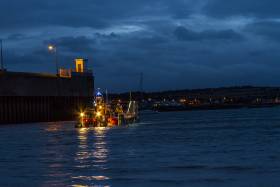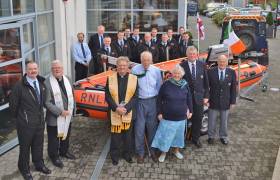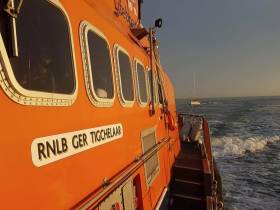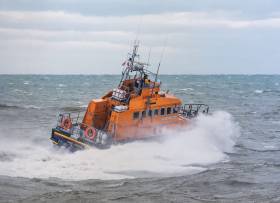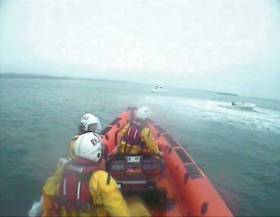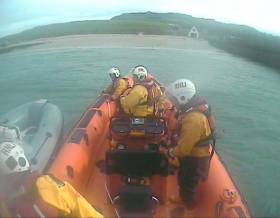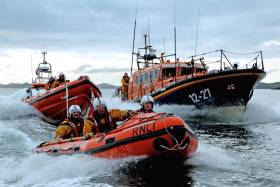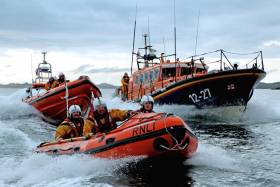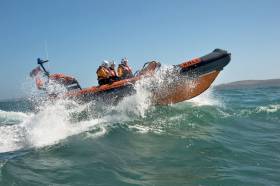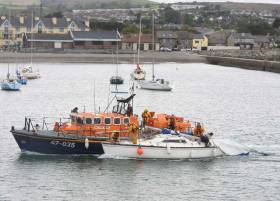Displaying items by tag: Lifeboats
Medical Emergency On Lambay Island Prompts Skerries Lifeboat Launch
#RNLI - Skerries RNLI launched yesterday evening (Sunday 22 October) after receiving reports of a medical emergency on Lambay Island.
Shortly after 8.30pm, the alarm was raised by a member of the crew when they received a call from Lambay Island, indicating that a person was unwell and requiring immediate medical assistance.
Skerries RNLI volunteers launched their Atlantic 85 inshore lifeboat Louis Simson with David Knight at the helm and crewed by Steven Johnston, JP Tanner and Jack Keane.
The lifeboat proceeded to the island where they went ashore and began to administer first aid to the casualty — as well as prep a landing area for the Dublin-based Irish Coast Guard helicopter Rescue 116, who transferred the casualty to a waiting ambulance on the mainland for treatment at Beaumont Hospital.
“There were multiple rescue agencies involved in this rescue and it’s great to see everyone working so well together,” said Skerries RNLI lifeboat press officer Gerry Canning. “Our thoughts are with the casualty tonight and we wish them a speedy recovery.”
In other rescue news, PSNI officers have been praised for their “swift action” in saving a man whose car entered Lough Neagh in the early hours of yesterday morning.
As the Belfast Telegraph reports, four officers entered the water to free the man, who was unresponsive, from the partial submerged Volkswagen. He was later transferred to hospital with suspected hypothermia.
Clifden RNLI Name New Inshore Lifeboat ‘Celia Mary’
#RNLI - Clifden RNLI officially named its new D class lifeboat Celia Mary at a special ceremony and service of dedication held yesterday (Saturday 21 October) in the Connemara coastal town.
The honour of handing over the lifeboat and officially naming her went to the donor Peter Ross, husband of the late Celia.
He was accompanied at the ceremony in the Station House Hotel by his family and Celia’s best friend Rea Hollis, who has made a generous donation towards the running costs of Clifden Lifeboat Station.
Celia, who was from East Sussex but was of Irish descent, died three years ago shortly after her 79th birthday. She had always wanted to fund a lifeboat.
A much-loved wife and mother of five children, Celia spent many years living self-sufficiently and keeping cows and sheep. She had a great sense of humour and her kitchen was the focal point of her village.
Her idyllic life came to an end when rheumatoid arthritis took hold. But despite suffering from subsequent ill health, this did not stop her from becoming a respected antiques dealer until what has been described as her indomitable spirit succumbed and she passed away.
During the ceremony, Niamh McCutcheon, a member of the Irish Council of the RNLI, accepted the lifeboat on behalf of the charity from Peter Ross, before handing her over into the care of Clifden Lifeboat Station.
During her address, McCutcheon praised the efforts of all those who supported the work of the station.
“In 2017, Clifden RNLI has been requested to respond to 17 call outs, with a total of 26 launches, bringing 18 people to safety between the three different lifeboats on station here. You cannot put a price on the impact that has on people’s lives, whether they are volunteers or casualties.
“Our lifesavers could not have answered those calls for help without the support they receive from fellow volunteers on the shore: the fundraisers, the launch crew and the station management. In fact the whole of the RNLI depends on those people who represent our charity in the community.”
Lifeboat operations manager John Brittain accepted the lifeboat on behalf of Clifden RNLI ahead of the blessing in a service of dedication led by Father James Ronayne and the Very Reverend Stan Evans. The lifeboat was then officially named by Peter Ross.
Brittain said the event was a special occasion for the lifeboat station, adding that the crew were most grateful to Peter for his generous gift in memory of his wife which had funded the lifeboat.
“Celia always wanted a lifeboat, and now she has one in Clifden,” he said. “While her lifeboat may be a little far from her family, we have been told by her loved ones that Celia, who was of Irish descent, would have revelled in the beauty of Galway, Connemara and the Atlantic coast.”
The D class Celia Mary replaces the Grainne Uaile which served Clifden RNLI for the last 10 years. During that time, the lifeboat launched 62 times, bringing 20 people to safety.
Originally introduced in 1963, the D class has evolved into a highly capable modern lifeboat. It is the workhorse of the RNLI’s fleet and is ideal for working close inshore, near rocks or in shallow water in moderate conditions. It can be righted by the crew if it capsizes and is also part of the RNLI flood rescue team’s fleet of boats.
She comes into her own for searches and rescues in the surf, shallow water and confined locations - often close to cliffs, among rocks and even inside caves.
The RNLI established a lifeboat station in Clifden in early 1988 when a C class lifeboat was put on service for one season’s evaluation. The following year, Clifden RNLI became fully operational as a summer season-only lifeboat station.
In 1997, an Atlantic 21 lifeboat was placed on service and a new boathouse for the lifeboat and a tractor was completed in August 1998. A new D class lifeboat was placed on service in May 1998, and the following year it was joined by a new Atlantic 75 B class lifeboat which remained stationed until June 2013 when it was replaced by the Atlantic 85 named Joyce King.
A crowd of well wishers turned up to see the lifeboat officially named, with a bottle of champagne poured over the side of the boat before it launched at the end of the ceremony.
Among the guests on the platform party were Pearse Hyland, chair of the Lifeboat Management Group, who welcomed guests and opened proceedings, and inshore lifeboat mechanic Andy Bell, who gave a vote of thanks and closed proceedings.
Arklow Lifeboat Assists Stricken Sailing Vessel With Two Aboard
#RNLI - Arklow RNLI was launched yesterday evening (Tuesday 17 October) following a call for assistance from the crew of a sailing vessel reporting mechanical failure.
The volunteer crew on board Arklow's all-weather lifeboat proceeded to the reported position approximately 12 miles south of Arklow in Co Wicklow. Weather conditions were calm and dry at the time, 24 hours after Storm Ophelia passed over Ireland.
Once the yacht had been located, it was decided to put a lifeboat crew member aboard the 10m sailing vessel to assist the crew of two.
Once a tow line was established, the vessel and her crew were towed back to Arklow where all came ashore safely.
Following the callout, Arklow RNLI volunteer press officer Mark Corcoran said: “Thanks to all of our volunteers on this shout who are always ready 24 hours a day to drop what they are doing in their own lives to go to sea to assist others.”
Larne & Bangor Lifeboats Answer Pager Call During Storm Ophelia
#RNLI - Both Larne and Bangor RNLI were requested to launch last night (Monday 16 October) by Belfast Coastguard during Storm Ophelia.
The volunteer lifeboat crew pagers sounded at 9.25pm following reports of a person in the water at Whitehead off the Antrim coast.
Sea conditions at the time were very rough with winds gusting up to 60mph (97kmh).
As the Larne RNLI crew assembled and made preparations to leave the Port of Larne, Belfast Coastguard cancelled the launch following confirmation from the PSNI that two women were ashore safe and well.
Larne Coastguard, Portmuck Coastguard and the PSNI were also tasked to the incident.
Speaking later, Larne RNLI Coxswain Frank Healy said: “During what is extremely challenging weather conditions, I am proud to say 18 volunteers answered the call immediately. This demonstrates our crew dedication to help those in distress at sea.
“Our volunteer lifeboat crews will always launch to rescue those in danger at sea, but to launch into conditions like these could also put their lives at risk.
“I strongly urge people to respect the water and stay away from the coastline during the storm. If you do see someone else in trouble in the water, call 999 and ask for the coastguard. Don’t enter the water yourself as you could also end up in serious danger.”
#RNLI - A volunteer crew from Portaferry RNLI were preparing for a training exercise yesterday morning (Saturday 14 October) when they received a call to go to the aid of a man who had been thrown from a small motor boat which was subsequently spinning out of control in Strangford Lough.
The call was received at 10.53am and the volunteer lifeboat crew were on the water and on their way to the casualty by within two minutes, heading for a location roughly half a mile from Don O’Neill Island.
Weather conditions were cloudy with fair visibility, a Force 3 southerly wind and calm sea conditions.
On arrival at 11am, the volunteer crew learnt that the man had been thrown clear of the small dory when the craft had developed steering problems and started spinning in circles.
He was then lifted on board another boat which had been at the scene at the time, and taken ashore by them.
With the help of other boats attending a regatta in the area at the time, the Portaferry RNLI crew eventually brought the spinning craft under control, after which they attached tow lines to the vessel and towed it back into Portaferry Marina.
Two Midweek Callouts Within Hours For Skerries Lifeboat
#RNLI - Skerries RNLI launched yesterday afternoon (Thursday 12 October) for the second time in less than 24 hours.
Shortly after 12pm, Dublin Coast Guard received information that a RIB with one person on board had suffered engine failure north of the harbour at Lambay Island.
Skerries RNLI were tasked and the lifeboat was launched with volunteer Eoin Grimes at the Helm and crewed by Joe May, David Knight and Jack Keane.
Arriving at Lambay, the lifeboat crew spotted the vessel which had put out an anchor. A tow was established and the boat was towed safely to port.
Just hours before, shortly before 9pm on Wednesday (11 October), the lifeboat escorted a razor fishing vessel into Skerries Harbour.
The vessel had contacted Dublin Coast Guard for clarification on a navigational issue while approaching Skerries for an unscheduled stop. They were also having some slight mechanical problems with their steering.
It was decided as a precaution to request the lifeboat to escort the vessel to shore. On that occasion Joe May was on the helm, and the crew consisted of Conor Walsh, Jack Keane and JP Tanner.
Gerry Canning, lifeboat press officer for Skerries RNLI, said: “Both these call outs were to experienced seagoers who were just unlucky. Things can go wrong at sea no matter how prepared you are.
“Our volunteer crew are ready to respond 24/7 and it’s great to see some of our new volunteers gaining invaluable experience.”
Clifden Lifeboats Rescue Six After Boat Breaks Down Off Connemara Coast
#RNLI - Clifden RNLI’s all-weather and inshore lifeboats were launched shortly before 1pm on Sunday 8 October when a boat with six on board got into difficulty in the Killary Harbour area.
The location of the craft was unclear in the early stages as Clifden’s inshore D class lifeboat was driven by road to Renvyle by driver Neil Gallery and launched at Lettergesh Beach, while the Atlantic 85 inshore lifeboat was launched in Clifden.
The D class lifeboat, crewed by Alan Pryce, Kenneth Flaherty and Kieran Folan, swiftly located the boat and six passengers near Frehill island. They had been out for a fishing trip when their engine failed.
Shortly after, the Atlantic 85 lifeboat crewed by Joe Acton, Owen Hayes and Alvin Bell as the D Class already had the casualty boat under tow.
Four of the six passengers were transferred to the Atlantic 85, Joyce King, and returned to shore at Rossroe from where they had originally set out.
The other two remained onboard their own boat, which was towed back to shore by the D Class lifeboat, Granuaile.
Clifden’s all-weather lifeboat Fisherman’s Friend was also launched to provide additional cover for the rescue operation, but was stood down when the two inshore lifeboats had the situation under control.
Speaking following the callout, Clifden RNLI helm Alan Pryce said: “Luckily the weather conditions were calm at the time and due to our launch site we were able to locate the boat quickly.
“The area is known for its rip currents in the area and can be dangerous so we were glad to have been able to attend and assist as quickly as possible once the alarm was raised."
Pryce added: “We remind anyone planning a trip to sea to always go prepared and respect the water.”
RNLI Seeks Lifesaving Manager For Ireland & Isle Of Man
#RNLI - The RNLI is looking for “an experienced and dynamic leader” to run its 24-hour search and rescue on-call lifesaving service in Ireland and the Isle of Man.
The lifesaving manager heads a team of area managers and dedicated lifesavers and is responsible for the delivery and assurance of the lifeboat service, along with the lifeguard service in Northern Ireland and a flood rescue team.
The role requires “strong leadership skills, innovative working and the ability to identify new and exciting partnerships and opportunities” for the lifesaving charity.
Full details of the job description and how to apply are available on the RNLI website HERE.
Baltimore Lifeboat Assists Yacht In High Winds
#RNLI - Baltimore RNLI’s inshore lifeboat Patricia Jennings was called on Sunday (1 October) to go to the assistance of a 28ft yacht with one person on board.
The yacht had lost power near the West Cork harbour's west pier and was in danger of drifting ashore amid Force 7 westerly winds.
The skipper of the yacht had thrown out his anchor which was holding it in position, but without power was unable to get away from the vicinity of the shore.
The alarm was raised by a another vessel, also with one on board, which was standing by but unable to assist.
Under helm Kieran Collins and crew Jerry Smith and Colin Rochford, the lifeboat immediately launched and was in scene within 15 minutes of alarm being raised.
One crew member was put on board to assist the casualty. A tow was then rigged and the yacht was towed to safety.
Also responding to the callout were Ian Lynch and Youen Jacob. Ronnie Carthy, Kieran Cotter and Colin Whooley acted as shore crew.
Wicklow Lifeboats Launch To Help Dismasted Yacht
#RNLI - Wicklow RNLI’s all-weather and inshore lifeboats launched yesterday afternoon (Sunday 1 October) after a 9m yacht with three people on board was reported to have lost its mast and rigging while racing in Wicklow Bay.
The all-weather lifeboat was alongside the dismasted yacht four minutes after launching at 3.30pm. Three lifeboat crew boarded the yacht and, as a precaution, two children were transferred from the stricken vessel onto the lifeboat.
Meanwhile, the inshore lifeboat crew were tasked with recovering the mast and sail from the sea, which were still connected by rigging to the yacht.
Once the mast and sail were recovered and secured, a tow line was established and the yacht was returned to Wicklow Harbour, where it was safely secured alongside the South Quay. Thankfully no one was injured during the incident.
Conditions at the scene had a westerly Force 3 wind with good visibility and a slight sea state.
The crew on this callout on the all-weather lifeboat were second coxswain Ciaran Doyle, mechanic Connie O'Gara, David O’Leary, Graham Fitzgerald, Vinny Mulvihill, Peter McCann, Joe Hanlon and John Stapleton. On the inshore lifeboat were helm Alan Goucher, Lisa O’Leary and Dean Mulvihill.


























